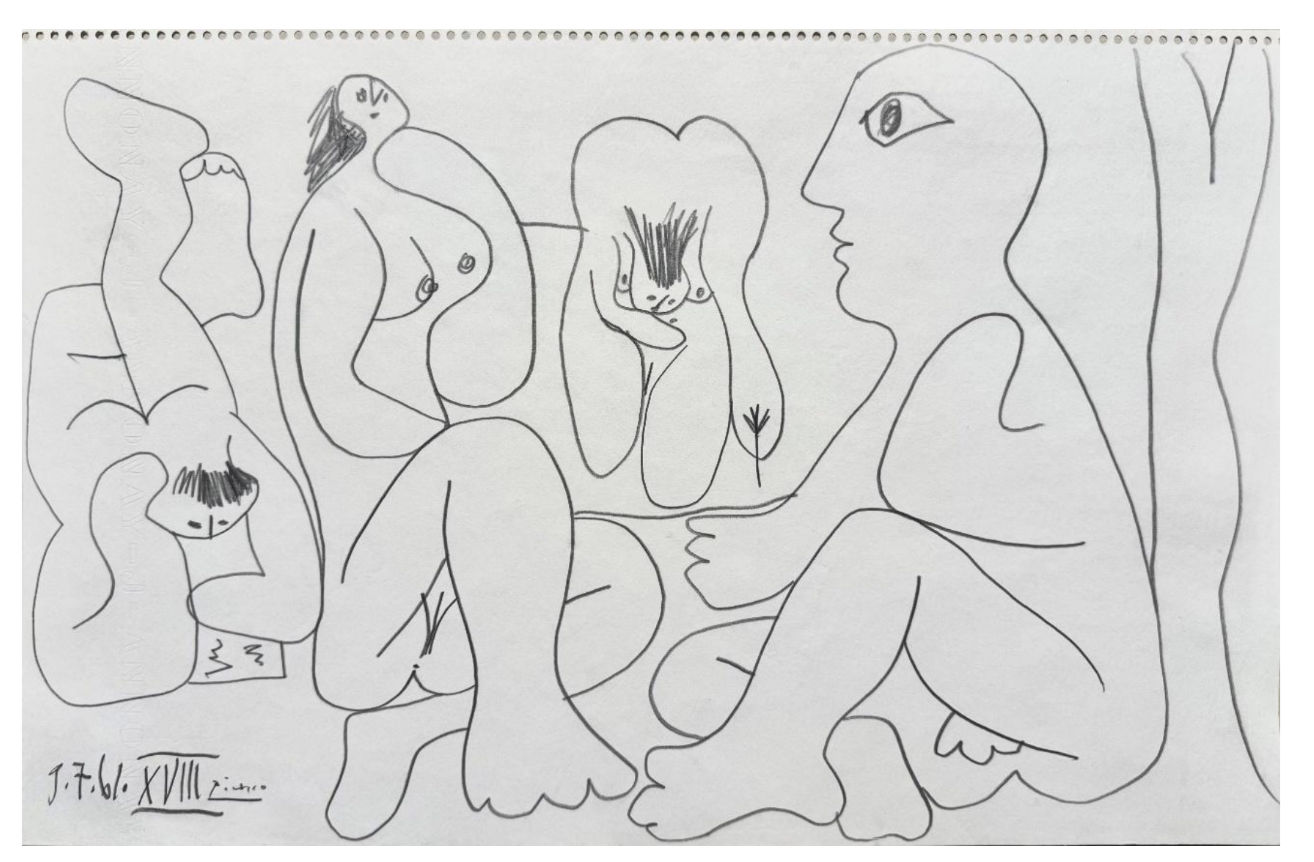
Pablo Picasso
Signed and numbered
27 x 42 cm
This 1961 graphite-on-paper drawing by Pablo Picasso, part of his Les Déjeuners series, exemplifies the artist’s late style: spontaneous, unapologetically erotic, and defiantly liberated from classical constraints. Dating from July 7, 1961—when Picasso was 79 years old—this work is both a tribute and a transformation of Édouard Manet’s Le Déjeuner sur l’herbe (1863), a painting that itself broke with convention in its portrayal of a nude woman picnicking with clothed men in a pastoral setting.
The drawing is executed in Picasso’s fluid, unbroken line, capturing five figures (four female and one male) in a compressed and intimate arrangement. Each figure is contorted into exaggerated poses, their bodies distilled into simplified, curvaceous forms. Limbs are thick and stubby, genitals are overtly emphasized, and faces are rendered with minimal yet expressive features—such as Picasso’s signature almond-shaped eye and stark profile contours.
Rather than aiming for anatomical accuracy, Picasso leans into abstraction and erotic caricature. The composition balances chaos and order: though figures overlap and press into one another, the linework remains deliberate, guiding the viewer's gaze around the scene in a rhythmic flow. The artist’s hand is constantly visible—there is no attempt to polish or refine; spontaneity is celebrated as a mark of artistic truth.
There is a strong graphic quality to the work. The use of graphite gives it an immediacy, and the absence of shading or tonal variation keeps the image rooted in the conceptual. It is drawing as thinking—an intellectual and sensual act performed in real time.
This drawing fits within Picasso’s lifelong dialogue with the history of art. Like his series on Las Meninas (after Velázquez) or The Women of Algiers (after Delacroix), the Les Déjeuners drawings are not mere copies or homages but reinventions. By taking Manet’s original composition—a daring image for its time—and reworking it into his own late language, Picasso simultaneously acknowledges art history and asserts his dominance over it.
But Picasso also injects the series with something Manet did not: overt sexual energy and grotesque humor. His nudes are not delicate muses but monumental presences—earthy, unapologetic, and absurd. There is a democratization of the body here: flesh is not idealized but joyfully distorted, unbound by social or aesthetic expectations.
This approach aligns with the themes of Picasso’s later years, in which eroticism, mythology, and satire converge. These works are less concerned with the politics of the gaze and more about the raw dynamics of desire, age, and memory. At the same time, they exude a certain vulnerability—an aging artist reflecting on youth, sensuality, and the timeless cycle of human intimacy.
By 1961, Picasso had transcended stylistic categories. He was no longer Cubist, Surrealist, or Neoclassicist—he was wholly Picasso. This drawing embodies the culmination of decades of experimentation: the playful line of his Blue Period, the abstraction of Cubism, the emotional intensity of Guernica, and the eroticism of his post-war works.
In Les Déjeuners, Picasso strips the scene to its essence—line, body, space, and impulse. It is both deeply personal and art-historically engaged, bridging the ancient with the modern, the refined with the carnal. This drawing is not just a sketch—it is a manifesto of creative freedom.
For more information, contact our galleries via the inquiry form below.
-
 Pablo PicassoThe Foot Bath | Le Bain de pieds, 1960
Pablo PicassoThe Foot Bath | Le Bain de pieds, 1960 -
 Pablo PicassoFemme tenant un journal, 1915
Pablo PicassoFemme tenant un journal, 1915 -
 Pablo PicassoTrois Personnages,, 1954
Pablo PicassoTrois Personnages,, 1954 -
 Pablo PicassoQuatre têtes d’élégantes (Four Elegant Heads), c. 1899
Pablo PicassoQuatre têtes d’élégantes (Four Elegant Heads), c. 1899 -
 Pablo PicassoLes Dejeuners, 1961
Pablo PicassoLes Dejeuners, 1961 -
 Pablo PicassoHomme et Femme, 1926
Pablo PicassoHomme et Femme, 1926 -
 Pablo Picasso·Toros, 1961
Pablo Picasso·Toros, 1961 -
 Pablo Picasso·Étude pour la Suite Des Déjeuners III, 1959
Pablo Picasso·Étude pour la Suite Des Déjeuners III, 1959 -
 Pablo PicassoLe déjeuner, 1962
Pablo PicassoLe déjeuner, 1962 -
 Pablo PicassoLes déjeuners,, 1961
Pablo PicassoLes déjeuners,, 1961
Join our mailing list
* denotes required fields
We will process the personal data you have supplied in accordance with our privacy policy (available on request). You can unsubscribe or change your preferences at any time by clicking the link in our emails.
This website uses cookies
This site uses cookies to help make it more useful to you. Find out more about cookies.









